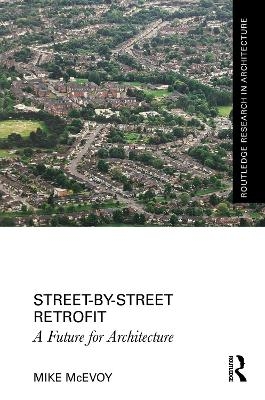
Street-by-Street Retrofit
Routledge (Verlag)
978-1-032-93226-2 (ISBN)
For many years, it has been recognised that improving the energy performance of the existing housing stock is vital if energy demand is to be reduced to combat climate change. The art of retrofit is posited as a way forward beyond today’s weak pseudo-Modernist architecture – all that is left – the final echo of Modernism’s original utopian impulse.
Central to the book is the presentation of domestic street-by-street retrofit as an issue with technical, financial and societal dimensions. A holistic view of the complex, interacting factors that have held back any advance is interspersed with a historical account of retrofit’s faltering progress over the last 20 years. The crucial challenges that have been encountered are described, including the technological and human factors that urgently need to be addressed. It is suggested that the utopian instincts that propelled early Modernism can be redeployed in finding an approach to retrofit that will pave the way towards a politically engaged architecture of social purpose.
Street-by-Street Retrofit’s goal is to involve the creative imagination of designers and form an alliance with policymakers and many others in the business of urban improvement; it is intended for all these audiences.
Mike McEvoy studied at Cambridge prior to registration as an architect, then went on a postgraduate scholarship to Cornell; his PhD is from the Bartlett. He was in practice in the United States and Canada and for a decade with Arup Associates in London. Subsequently, he was Coordinator of Technical Studies at the University of Westminster; on the faculty at Cambridge and a Fellow Commoner of Downing College; and latterly, Professor of Architecture at the University of Brighton, where he led EU IFORE an Anglo/French €6.3million street-by-street retrofit programme (which is the background to this book). Previously, he had completed, and published, the outcomes of several funded research projects into low-energy construction. He has written three other books on architectural technology: Architecture and Construction in Steel, External Components, and Environmental Construction Handbook.
List of Figures
Foreword: What If the Just Transition Began at Home?
Acknowledgements
Introduction
Part I: The State of the Art
1 Which Way to Jump?
Case Study: Energiesprong
2 The Carrying Capacity of the Planet
The Anthropocene and nature
Sustainable development, its origins and implications
Ecomodernism and the magic of technology
The climate crisis and the crisis of culture
Cultural juncture
Case Study: EU IFORE Innovation for Renewal
3 Re-evaluation of Modernism
Tipping point
Regulation
Alternative directions
The ecomodernist direction: Geo-engineering
Case Study: Parity Projects
4 Sustainable Retreat
Technology (alone) is not the answer
The future slowdown
The idea of progress
Modernism and the natural world
Architecture as a belief system
Case Study: Link Road, Birmingham
5 Caring Architecture
The future role of the architect will be to build sparingly
Building little implies making good what we already have i.e. retrofit
Part II: A Brief History of Retrofit
6 Size of the Problem
The energy case for retrofit
Problem #1 Determining the Outcomes
7 Pre-requisites for Retrofit
Retrofit at the urban scale
Retrofit origins
The 40 per cent house
Problem #2 Insulation
8 Drivers for Change
Problem #3 Overheating
9 Home Truths
40 per cent house to achieving zero
Problem #4 Ventilation
10 Anticipating the Green Deal
Problem #5 Airtightness
11 Retrofit Comes to a Halt
Problem #6 Renewables
12 Measuring Success: 80% Reduction and ‘Retrofit for the Future’
Low carbon Britain
Problem #7 The occupants
13 The Progress of Retrofit
Retrofit and performance
Architects as retrofit leaders
Architectural skills required?
Part III: Towards a New Utopia
14 The Art of the Imagination
Retrofit realigned
Retrofit and utopia
15 The Problem of Theory
The politics of architecture
Capitalism and creative destruction
Modernism and radical politics
16 Architecture’s Very Uniquely Compromised Position
The roots of Modernism: Hannes Meyer and the New Objectivity (Neue Sachlichkeit)
The hidden aspects of consciousness, the uncanny, Gothic and Surrealism
Urban ecology
17 Echoes from the Past: Herbert Marcuse
Society as a work of art
Retrofit as the representation of society as a work of art
Marcuse’s utopia of hope, utopia as a realisable dream
Retrofit as subversive art
18 Retrofit and Architects: A Future
Architects and innovation – Our utopian mission
Architecture or extinction
Index
| Erscheint lt. Verlag | 16.12.2024 |
|---|---|
| Reihe/Serie | Routledge Research in Architecture |
| Zusatzinfo | 6 Halftones, black and white; 6 Illustrations, black and white |
| Verlagsort | London |
| Sprache | englisch |
| Maße | 156 x 234 mm |
| Themenwelt | Naturwissenschaften ► Biologie ► Ökologie / Naturschutz |
| Technik ► Architektur | |
| Technik ► Bauwesen | |
| Technik ► Umwelttechnik / Biotechnologie | |
| ISBN-10 | 1-032-93226-0 / 1032932260 |
| ISBN-13 | 978-1-032-93226-2 / 9781032932262 |
| Zustand | Neuware |
| Informationen gemäß Produktsicherheitsverordnung (GPSR) | |
| Haben Sie eine Frage zum Produkt? |
aus dem Bereich


